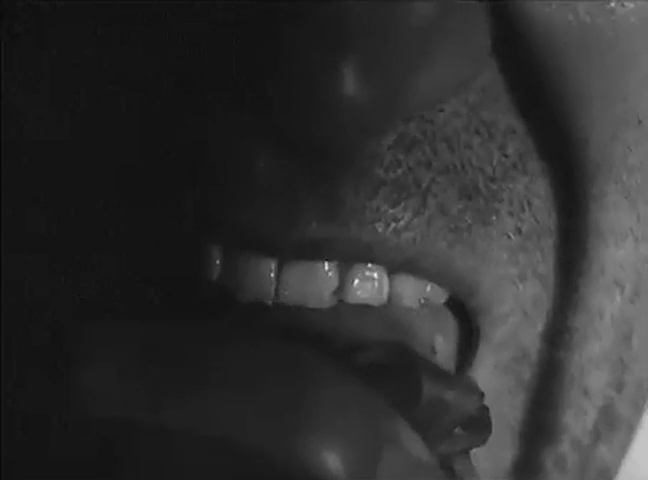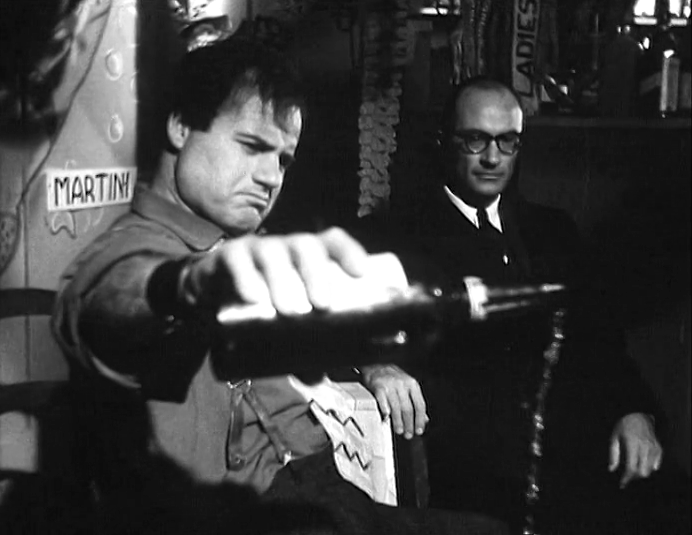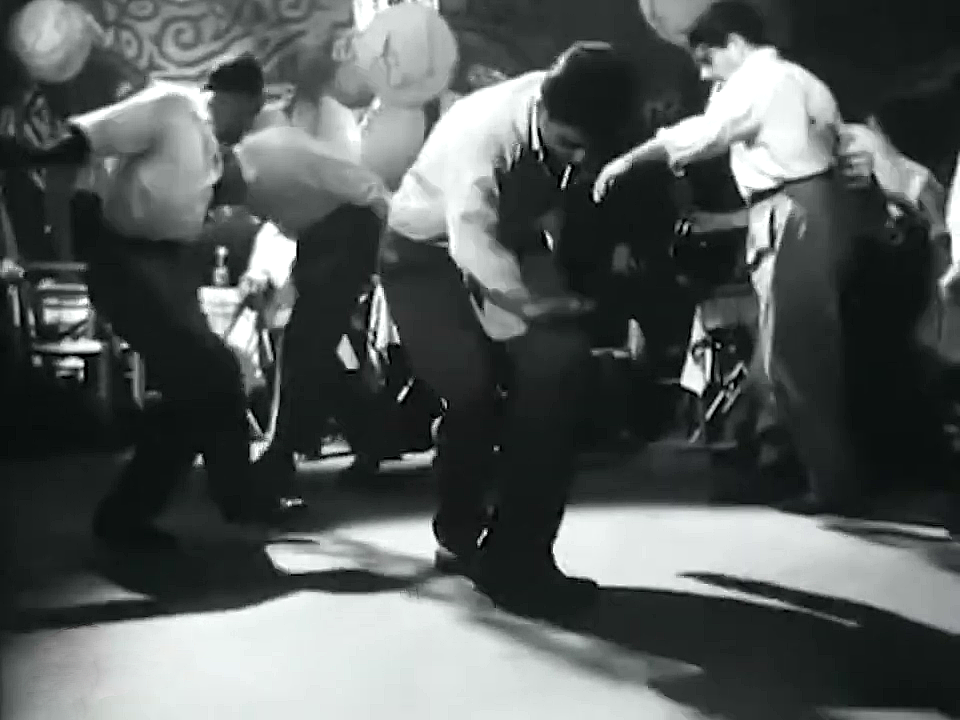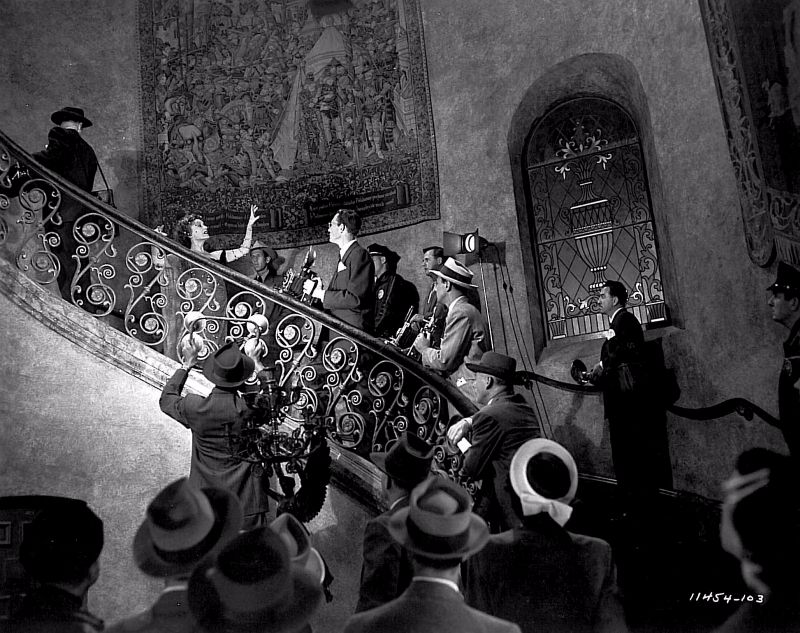Raggare! [Blackjackets] (Olle Hellbom, 1959)
Apr
3

Bibban, a beaming blonde (Christina Schollin) in a petticoat, at a small bar table smoking a cigarette. There's an half-empty glass and a full ashtray next to her. Just offscreen the object of her smile: a smartly dressed man reaching for his glass. DPs: Frank Dalin & Bertil Palmgren.
1950s
“Can we not admit that certain skilled men, gifted with intelligence, talent or even genius, and thus indispensable to society, rather than stagnate, should be free to disobey laws in certain cases?”Pickpocket (Robert Bresson, 1959)
Mar
12

Michel (Martin LaSalle) in a busy café, observing. An emptied water glass next to the thief should make him look like a paying guest. DP: Léonce-Henri Burel.
– Michel
Hägringen [Mirage] (Peter Weiss, 1959)
Feb
12

An uncomfortably close close-up up of a man's mouth eating something. Tongue and mouth are visible. He's got stubble. DP: Gustaf Mandal.
Weegee’s Coney Island [Coney Island] (Arthur “Weegee” Fellig, 1954)
Feb
10
Good Humor

Two chubby ladies on Coney Island's beach eating chocolate-coated ice cream bars on a stick, I guess Good Humor bars. The women both wear black shapeless bathing suits. One of them has a pink towel over her shoulders and her hair in rollers. The framing shows only part of the couple, but tells you all you need to know. DP: Weegee.
“Excuse me, Mrs. Crane. This coffee made me think how good whiskey would taste.”Day of the Outlaw (André De Toth, 1959)
Feb
2
coffee

Blaise Starrett (Ryan) and Mrs Crane (Louise) at a table. There are coffee cups and the talk is tense. DP: Russell Harlan.
– Dan, Starret's foreman
“You know, it isn't what a man wants to do, Lacey, but what he has to do. Now take me – I love to smoke cigarettes, but the doctors say I can't have them. So what do I do? I chew toothpicks, tons of them.”Crime Wave [The City Is Dark] (André De Toth, 1953)
Jan
29
dinner for two

Ellen Lacey (Phyllis Kirk) serving a bunch of punks (Bronson (2nd from the left, and Ted de Corsia (right) the food she prepared for herself and her husband Steve (Gene Nelson). DP: Bert Glennon.
– Det. Lt. Sims
Ο Δράκος [O Drakos / The Ogre of Athens / The Ogre / The Vampire] (Nikos Koundouros, 1956)
Jan
2
Martini

The boss, Hondros (Giannis Argyris), pours out a stiff drink on the floor of his cabaret with Mr Tomas (Dinos Iliopoulos) in the background. DP: Kostas Theodoridis.
The first film dinner of 2024.
Ο Δράκος [O Drakos / The Ogre of Athens / The Ogre / The Vampire] (Nikos Koundouros, 1956)
Dec
31
New Year's Eve

Men in identical white shirts and dark slacks dancing in the club during after hours. Their upper bodies seem top-heavy, tending to lunge towards the ground. DP: Kostas Theodoridis.
New Year's Eve celebrations.
A mousy bank clerk (Dinos Iliopoulos), who bears an uncanny resemblance to a criminal on the run, finds himself hiding in a shady cabaret on New Year's Eve instead of spending a quiet evening alone. During his forced stay at the nightclub, he comes to enjoy and identify more and more with his newfound persona and assumes the role of the notorious “Drago”.
An initial box office dud, it is now considered one of the top ten all-time best Greek films.
Happy new year, everyone! On to many more cinematic discoveries!
“Time to empty our slop pails and run a little water over our faces, then back to our cells for the entire day.”Un condamné à mort s'est échappé ou Le vent souffle où il veut [A Man Escaped] (Robert Bresson, 1956)
Dec
29
slop

A man's hand holds a spoon at a perpendicular angle. DP: Léonce-Henri Burel.
– Fontaine
“I am big. It's the pictures that got small.”Sunset Boulevard (Billy Wilder, 1950)
Dec
21
Short Girl Appreciation Day

Norma Desmond (Gloria Swanson) descending an ornate staircase. The size of the set gives you an approximate idea of her height. Even when several steps above him, Swanson's dwarfed by the photographer in the dark suit and glasses. DP: John F. Seitz.
The main character is a “short girl” [I do not agree with the infantilizing wording] on Short Girl Appreciation Day (USA)
The great Gloria Swanson (4'11” – 5ft 2 / 1,49 m) – fabulously decked out by Edith Head (5'1” / 1,55 m) with an endless parade of platform shoes – in Billy Wilder's Sunset Blvd. (1950).
– Norma Desmond
Also starring, Buster Keaton, who was 5'5” / 1,65 m.